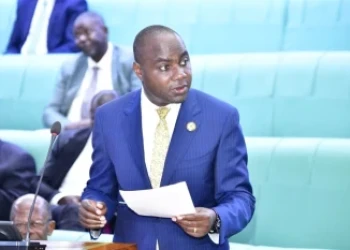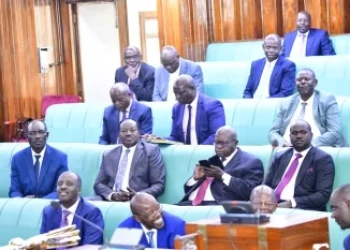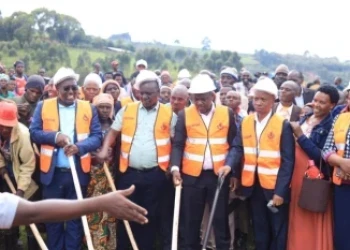
Cabinet has approved legislation to regulate the relationship of Landlords and their tenants under the Housing sector. The development was revealed by Chris Baryomunsi, the state minister for housing, during a press briefing at Uganda media centre this morning.
Dr. Baryomunsi had accompanied the Information minister Frank Tumwebaze to present the Cabinet decisions before the media. According to the minister, Cabinet sat on Monday April 9th 2018 reached the decision after consultation with stake holders.
“Uganda has old and obsolete laws governing the rental housing subsector. These laws inclide the Rental Restriction Act (Cap 231) of 1959 and the Distress for Rent (Bailiffs) Act, Cap 76 of 1933, he said.
He added that the lack of a regulatory framework for rental premises has often resulted into unresolved conflicts and violation of rights for both the landlords and tenants.
He emphasizes that this situation has greatly undermined the harmonious relationship of tenants and landlord, resulting in poor quality rentable premises, forceful evictions and destruction of property on either side, calling for forceful evictions and destruction of property on either side, calling for the need to regulate the relationship between landlords and tenants.
Some of the stakeholders consulted by government before reaching its decision include;
All ministries and local governments, Uganda law reform commission, the association of real estates’ agents, Uganda home builders association, KACITA, Uganda law society among others.
Dr. Baryomunsi further informed the media, that government has already embarked on the process of drafting a Bill to regulate the relationship between landlords and tenants; to reform and consolidate the law relating to the letting of prmises, as well as balancing the responsibilities of landlords and tenants in relation to letting of premises and for related matters.
The decision was informed by the continued charging of rent in foreign currencies, poor maintenance of rental premises, high defaulting rate in rent and utilities by tenants, obsolete laws relating to the rental housing subsector, unilateral increase of rent and arbitrary house evictions, lack of privacy on the part of tenants, poor quality of rentable premises that lack the minimum infrastructure standards, and reluctance of landlords to rent their premises to vulnerable groups which they consider as risky groups.
The Bill seeks to; define the duties and responsibilities of Landlords and tenants in respect of rentable premises, to promote access to adequate housing and other rentable premises, to create a mechanism for proper functioning of the rental market for both residential and commercial premises, to establish a landlords/tenants dispute resolution mechanism, and to repeal the Rent Restriction Act (Cap 231) and the Distress for Rent (Bailiffs) Act, Cap 76.
Now, the Bill makes it mandatory for the parties to execute a tenancy agreement in writing, in order to document and provide a framework for their relationship, in making this agreement, the tenant shall provide a National ID or Alien Identification card, in case of non-citizens.
The Landlord’s responsibility shall be to provide rentable premises fit for human habitation, payment of property rates and relevant taxes, keeping the exterior of premises in good condition, and according the tenant peaceful & quiet possession and enjoyment of the premises.
On the other hand, the tenant shall pay the rent for premises, pay for the utilities and other charges, utilize the premises only for the intended use, keep interior of the premises in good and clean condition, avoid doing anything that would be nuisance to inconvenience others, and not to sublet any part of the premises without knowledge of the landlord.
The tenant shall also make a security deposit in advance as a safeguard against any damages to the premises that may be occasioned by the tenant.
The Bill also provides a framework for increasing or decreasing rent by the landlord after serving the tenant with a prior notice to which the tenant has to respond.
Comments (0)
📌 By commenting, you agree to follow these rules. Let’s keep HowweBiz a safe and vibrant place for music lovers!












